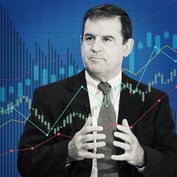Quick Take: Stocks may be moving upward recently, but Whitney George, manager of Royce Low-Priced Stock Fund (RYLPX), thinks the overall market could show little or no progress this decade. With the 1990s peace dividend disappearing, and regulators overreacting to corporate scandals, George thinks we could see a reprise of the 1970s when precious metals and energy stocks led the pack.
In this difficult environment, George feels his contrarian approach to small- and micro-cap stocks will lead to gains in illiquid and little followed areas of the market. Seeking the unwanted, George has been buying beaten-down technology stocks with valuations lower than the cash on their balance sheets. Purchases include Perot Systems`A` (PER), ViaSat Inc. (VSAT), and REMEC Inc. (REMC).
George says he focuses on the long haul, and the fund’s long-term results are respectable. For the five-year period through March, the fund rose an annualized 6.8%, versus a 0.1% loss for the average small-cap value fund. However, recent results have been hurt as volatile markets prompted investors to shift into larger-cap stocks, George said. For the one-year period through March, the fund fell 29.1%, while its peers lost 23.1%. But based on longer term quantitative and qualitative criteria, George was selected as one of 10 winners of the first annual Standard & Poor’s/BusinessWeek Excellence in Fund Management Awards.
The Full Interview:
S&P: What effect will geopolitical issues, such as the war in Iraq, have on investing?
GEORGE: September 11 and the Middle East conflicts are problems that have been building for a long time. The peace dividend of the 1990s won’t be around for a long time. We’re facing large deficits, both trade and fiscal, that will weaken the dollar and lead to higher interest rates. People will face issues similar to those of the 1970s.
S&P: The 1970s were a difficult time for investors. What strategies do you recommend for that type of environment?
GEORGE: The overall market could have little growth over this decade. The first three years have been difficult, so 8% to 9% returns for the rest of the decade would be very good. But this decade could still end up as a period of no progress.
People will need to focus on asset allocation and commodity-based investments, such as precious metals. Gold is likely to outperform, even if current problems subside.
S&P: How will small-cap value stocks do in this environment?
GEORGE: Small-cap value has been the best-performing style over the long run. Dealing with illiquid securities with gaps in information is hard to do and labor intensive, but there are often payoffs.
S&P: How do you deal with the volatility of small-cap and micro-cap stocks?
GEORGE: We view ourselves as risk managers. We hold about 200 stocks, and limit any one holding to no more than 2% of the portfolio. We also limit our industry exposure to about 20% of the portfolio.
With low-priced stocks, i.e., stocks with prices below $20 and $10 a share, there is an added level of volatility. We think we can take advantage of this volatility. Many institutions won’t own stocks selling for less than $10 a share.
S&P: How do you define the investment strategy?








 April 16, 2003 at 08:00 PM
April 16, 2003 at 08:00 PM









